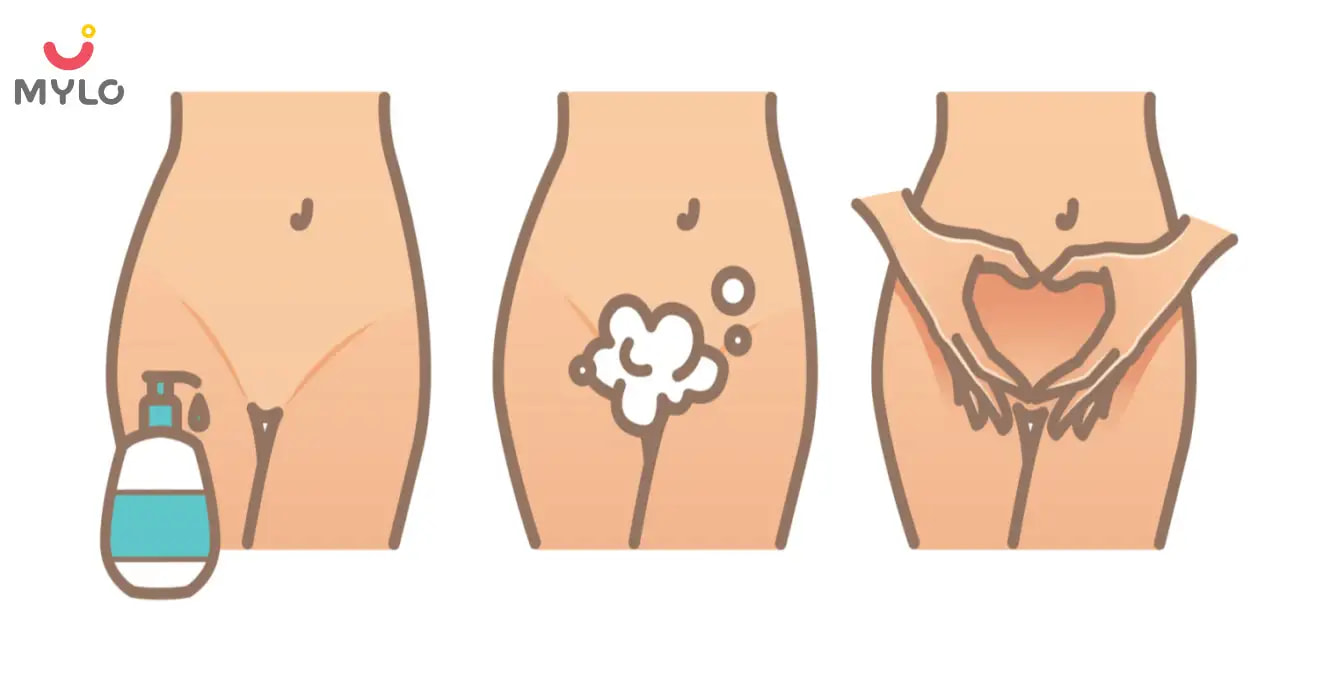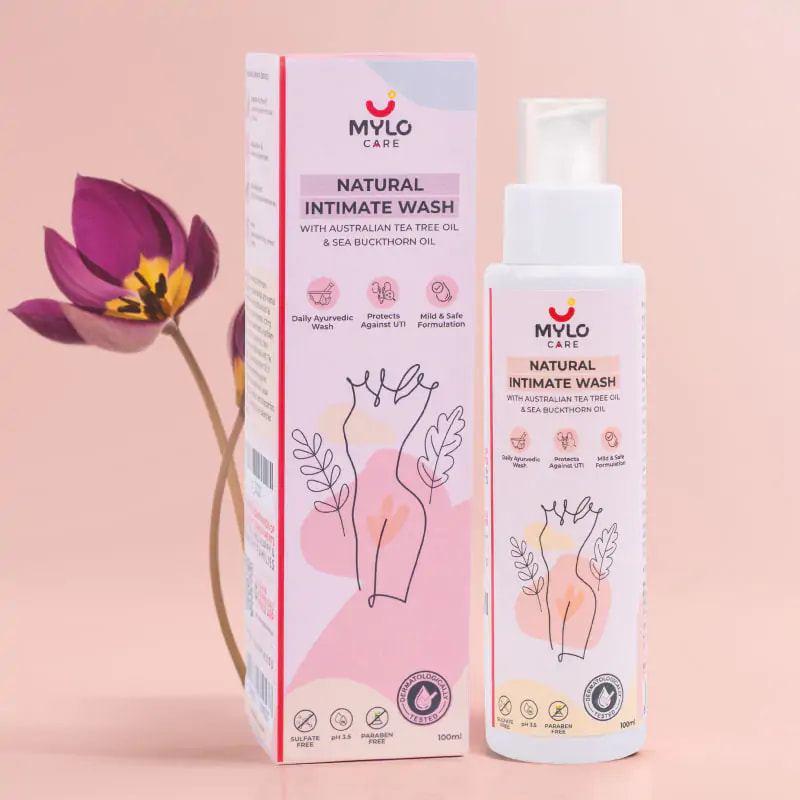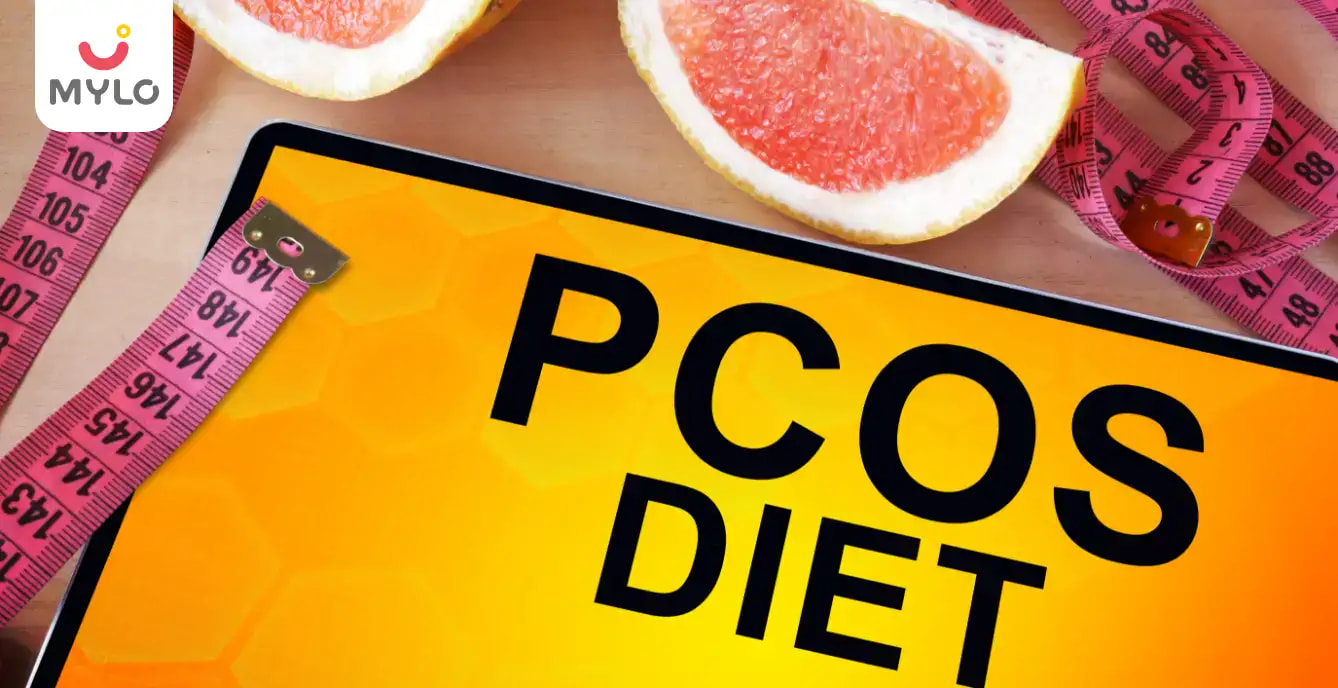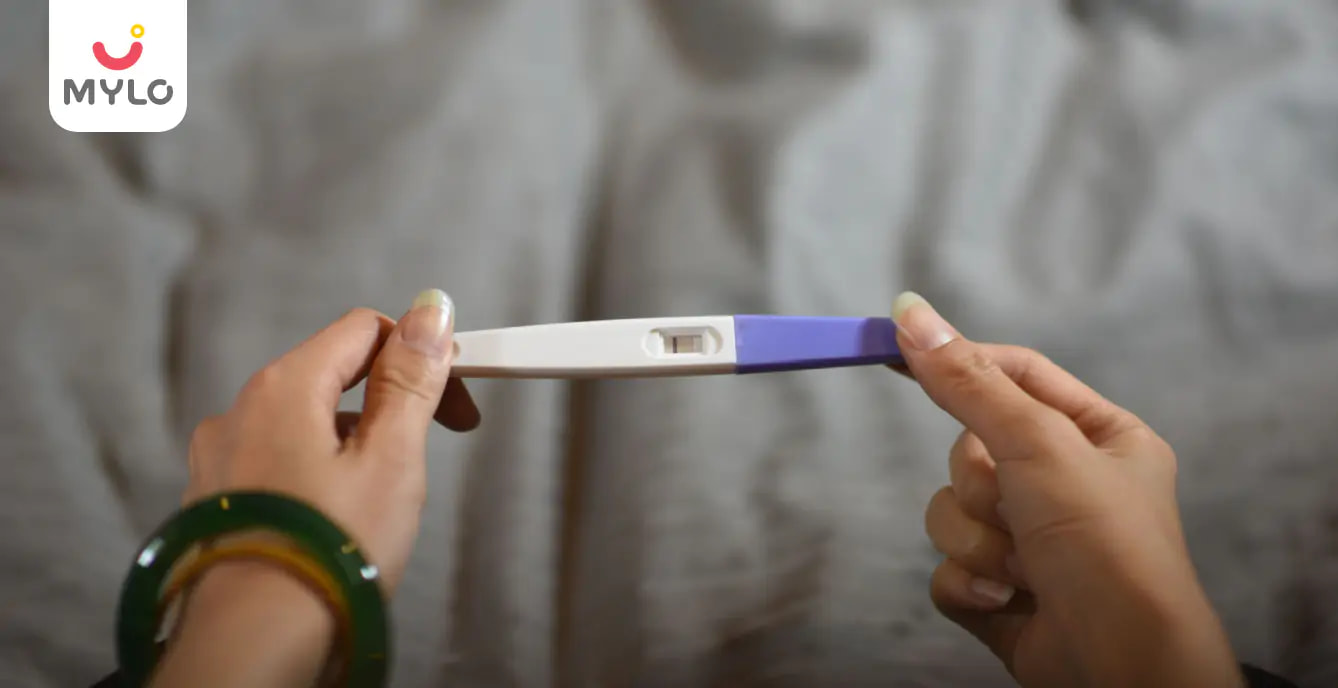- Home

- A Comprehensive Guide to Using an Intimate Wash During Pregnancy
In this Article

Pregnancy
A Comprehensive Guide to Using an Intimate Wash During Pregnancy
Updated on 3 November 2023
Pregnancy is a beautiful journey filled with numerous changes, both physical and emotional. One aspect of pregnancy that women often overlook is the impact it has on their vaginal health. Maintaining proper hygiene in the intimate area is essential for pregnant women as it helps prevent infections and discomfort. Using an intimate wash during pregnancy can be of help in this area but it’s important to understand its safety first.
In this article, we will explore the benefits, potential risks, and provide helpful tips to ensure a safe and effective use of intimate wash products during this delicate phase of life.
Changes in Vaginal Health During Pregnancy: What to Expect
As the body prepares for childbirth, several changes occur in the vaginal area. Understanding these changes can help expectant mothers take better care of their intimate health.
Here are some common changes in vaginal health during pregnancy:
1. Increased Vaginal Discharge
During pregnancy, many women experience an increase in vaginal discharge. This is completely normal and is the body's way of keeping the vagina clean and free from infections. However, the consistency and color of the discharge may change, which can cause discomfort or worry.
2. Hormonal Imbalance
Hormonal changes occur throughout pregnancy, and these changes can affect the pH balance of the vagina. A disrupted pH balance can lead to an overgrowth of harmful bacteria or yeast infections.
3. Increased Sensitivity
During pregnancy, the vaginal area becomes more sensitive due to increased blood flow and hormonal changes. This heightened sensitivity can lead to discomfort, itching, or irritation.
4. Risk of Infections
Pregnant women are more susceptible to vaginal infections due to the changes in their immune system. Yeast infections, bacterial vaginosis, and urinary tract infections are more common during pregnancy.
Can I Use Intimate Wash During Pregnancy?
Now that we understand the changes in vaginal health during pregnancy, the question arises: can we use intimate wash during pregnancy? The answer is yes, but with caution. Not all intimate washes are safe for use during pregnancy, as some may contain harsh chemicals or fragrances that can disrupt the delicate vaginal balance.
However, there are intimate washes specifically formulated for pregnancy that are safe to use. It is important to read the labels carefully and choose a product that is free from harmful ingredients.
How to Choose the Best Intimate Wash During Pregnancy?
When selecting an intimate wash for pregnancy, it is important to consider certain factors to ensure you choose the best product for your needs. Here are five tips to help you make an informed decision:
1. Look for a pH-Balanced Formula
Opt for an intimate wash that is specifically formulated to maintain the natural pH balance of the vagina. The pH must be between 3.5 and 4.5. This ideal pH helps eliminate any existing infections and protects the vulva. A pH-balanced formula will help prevent any disruptions in the vaginal flora and reduce the risk of infections.
2. Avoid Harsh Chemicals and Fragrances
Harsh chemicals and fragrances can irritate the sensitive vaginal area and disrupt the natural balance. Choose an intimate wash that is free from sulfates, parabens, and artificial fragrances to minimize the risk of irritation.
3. Opt for Natural Ingredients
Natural ingredients are gentle on the skin and provide effective cleansing without causing any harm. Look for an intimate wash that contains natural ingredients like aloe vera, chamomile, or tea tree oil, which offer soothing and antimicrobial properties.
4. Read Reviews and Recommendations
Before purchasing an intimate wash, read reviews and seek recommendations from other expectant mothers or healthcare professionals. Their experiences and insights can help you make an informed decision and choose a trusted product.
5. Consult Your Healthcare Provider
If you have any concerns or specific medical conditions, it is always best to consult your healthcare provider before using any intimate wash during pregnancy. They can provide personalized guidance based on your individual needs and ensure the product is safe for you and your baby.
You may also like: Does an Intimate Wash Help to Get Rid of Vaginal Itching?
What are the Benefits of Using Intimate Wash During Pregnancy?
Using an intimate wash can provide several benefits for expectant mothers. Here are five key benefits of using an intimate wash specifically designed for pregnancy:
1. Maintains Vaginal Hygiene
Proper hygiene is essential during pregnancy to prevent infections and maintain overall health. Using an intimate wash can help cleanse the vaginal area, removing bacteria, sweat, and other impurities. This promotes a healthy and clean environment, reducing the risk of infections and discomfort.
2. Restores and Maintains pH Balance
The pH balance of the vagina plays a crucial role in maintaining vaginal health. Pregnancy hormones can disrupt this balance, leading to an increased risk of infections. Using an intimate wash that is pH-balanced can help restore and maintain the natural pH level of the vagina, reducing the likelihood of infections and promoting optimal vaginal health.
3. Soothes Discomfort and Irritation
The increased sensitivity of the vaginal area during pregnancy can cause discomfort, itching, or irritation. Using an intimate wash that is gentle and free from harsh chemicals can help soothe and calm the delicate skin, providing relief from any discomfort or irritation.
4. Reduces Odor
Due to hormonal changes and increased vaginal discharge, some women may experience an unpleasant odor during pregnancy. Using an intimate wash that is specifically formulated for pregnancy can help neutralize any odor and leave you feeling fresh and confident.
5. Enhances Postpartum Recovery
Using an intimate wash during the postpartum period can aid in the healing process and promote faster recovery. It helps keep the vaginal area clean, reduces the risk of infections, and provides comfort during the postpartum phase.
You may also like: How to Clean Your Vagina & Vulva: A Complete Guide
How to Use Intimate Wash During Pregnancy?
Using an intimate wash is a simple and straightforward process. Here is a step-by-step guide to help you incorporate it into your daily hygiene routine:
-
Start by washing your hands thoroughly with soap and water.
-
Wet the vaginal area with lukewarm water.
-
Apply a small amount of intimate wash to your palm or a clean washcloth.
-
Gently massage the wash onto the external genital area, including the labia and the perineal area.
-
Rinse thoroughly with lukewarm water, ensuring all traces of the wash are removed.
-
Pat the area dry with a clean towel. Avoid rubbing, as it may cause irritation.
-
Follow up with your regular moisturizer or any other post-wash products recommended by your healthcare provider.
-
Wash your hands again after completing the process.
Remember to use an intimate wash only externally and avoid any contact with the inside of the vagina. If you experience any unusual symptoms or irritation after using an intimate wash, discontinue use and consult your healthcare provider.
You may also like: What Is the Best Way to Use an Intimate Wash?
Alternatives to Using Intimate Wash During Pregnancy
While using an intimate wash can offer numerous benefits, some women may prefer to explore alternative options. Here are a few alternatives to consider during pregnancy:
1. Plain Water
If you prefer a more minimalistic approach, you can simply use plain water to cleanse the vaginal area. Gently wash the external genital area with lukewarm water and pat dry with a clean towel.
2. Mild, Fragrance-Free Soap
Using a mild, fragrance-free soap can also be an alternative to an intimate wash. Choose a soap that is gentle on the skin and does not contain any harsh chemicals or perfumes.
3. Bidet or Sitz Bath
A bidet or sitz bath can provide a gentle and soothing cleansing experience. These devices allow you to cleanse the vaginal area with water, promoting hygiene and comfort.
Remember, whichever alternative you choose, it is important to maintain proper hygiene and seek guidance from your healthcare provider if you have any concerns.
Conclusion
Taking care of your intimate health during pregnancy is crucial for your overall well-being. Understanding the changes in vaginal health, using a safe and effective intimate wash during pregnancy, and following proper hygiene practices can help prevent infections, reduce discomfort, and promote optimal vaginal health. With the right care and attention, you can ensure a healthy and comfortable pregnancy journey.
References
1. Chen Y, Bruning E, Rubino J, Eder SE. (2017). Role of female intimate hygiene in vulvovaginal health: Global hygiene practices and product usage. Womens Health (Lond).
2. Badran YA, El-Kashef TA, Abdelaziz AS, Ali MM. (2015). Impact of genital hygiene and sexual activity on urinary tract infection during pregnancy. Urol Ann.

Mylo Care Feminine Intimate Wash 100ml
₹ 162

4.4
(459)


2749 Users bought



Written by
Priyanka Verma
Priyanka is an experienced editor & content writer with great attention to detail. Mother to an 11-year-old, she's a ski
Read MoreGet baby's diet chart, and growth tips

Related Articles
Related Questions
Influenza and boostrix injection kisiko laga hai kya 8 month pregnancy me and q lagta hai ye plz reply me

Hai.... My last period was in feb 24. I tested in 40 th day morning 3:30 .. That is faint line .. I conculed mylo thz app also.... And I asked tha dr wait for 3 to 5 days ... Im also waiting ... Then I test today 4:15 test is sooooo faint ... And I feel in ma body no pregnancy symptoms. What can I do .

Baby kicks KB Marta hai Plz tell mi

PCOD kya hota hai

How to detect pcos

RECENTLY PUBLISHED ARTICLES
our most recent articles

Diet & Nutrition
গর্ভাবস্থায় আলুবোখরা: উপকারিতা ও ঝুঁকি | Prunes During Pregnancy: Benefits & Risks in Bengali

Diet & Nutrition
গর্ভাবস্থায় হিং | ঝুঁকি, সুবিধা এবং অন্যান্য চিকিৎসা | Hing During Pregnancy | Risks, Benefits & Other Treatments in Bengali

Women Specific Issues
স্তনের উপর সাদা দাগ: লক্ষণ, কারণ এবং চিকিৎসা | White Spots on Nipple: Causes, Symptoms, and Treatments in Bengali

Diet & Nutrition
গর্ভাবস্থায় পোহা: উপকারিতা, ধরণ এবং রেসিপি | Poha During Pregnancy: Benefits, Types & Recipes in Bengali

Diet & Nutrition
গর্ভাবস্থায় মাছ: উপকারিতা এবং ঝুঁকি | Fish In Pregnancy: Benefits and Risks in Bengali

Diet & Nutrition
গর্ভাবস্থায় রেড ওয়াইন: পার্শ্ব প্রতিক্রিয়া এবং নির্দেশিকা | Red Wine During Pregnancy: Side Effects & Guidelines in Bengali
- ইনার থাই চ্যাফিং: কারণ, উপসর্গ এবং চিকিৎসা | Inner Thigh Chafing: Causes, Symptoms & Treatment in Bengali
- গর্ভাবস্থায় ব্রাউন রাইস: উপকারিতা ও সতর্কতা | Brown Rice During Pregnancy: Benefits & Precautions in Bengali
- Velamentous Cord Insertion - Precautions, Results & Safety
- Unlock the Secret to Flawless Skin: 7 Must-Have Qualities in a Face Serum
- Unlock the Secret to Radiant Skin: How Vitamin C Serum Can Transform Your Complexion
- Gender No Bar: 10 Reasons Why Everyone Needs a Body Lotion
- Unlock the Secret to Radiant Skin How to Choose the Perfect Body Lotion for Your Skin Type
- Top 10 Reasons to Apply a Body Lotion After Every Bath
- Communication in Toddlers: Milestones & Activities
- How to Improve Vocabulary for Toddlers?
- A Comprehensive Guide to Understanding Placenta Accreta
- Vulvovaginitis in Toddlers Causes, Symptoms and Treatment
- A Comprehensive Guide to Understanding Cerebral Palsy in Children
- Bitter Taste in Mouth During Pregnancy: Understanding the Causes and Remedies


AWARDS AND RECOGNITION

Mylo wins Forbes D2C Disruptor award

Mylo wins The Economic Times Promising Brands 2022
AS SEEN IN
















- Mylo Care: Effective and science-backed personal care and wellness solutions for a joyful you.
- Mylo Baby: Science-backed, gentle and effective personal care & hygiene range for your little one.
- Mylo Community: Trusted and empathetic community of 10mn+ parents and experts.
Product Categories
baby carrier | baby soap | baby wipes | stretch marks cream | baby cream | baby shampoo | baby massage oil | baby hair oil | stretch marks oil | baby body wash | baby powder | baby lotion | diaper rash cream | newborn diapers | teether | baby kajal | baby diapers | cloth diapers |








